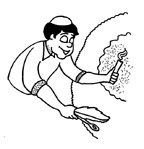|
The Shapiro family was getting ready for bedikas chometz. "Let's go, Yossi!" Shmuli urged his younger brother. "Hide your pieces already."
But Yossi was taking his time. "Benny," Yossi turned to another brother, whispering, "did you hide one of your pieces behind the fridge, or is that Leah's?" 
"Oh, come on, let's get on with this," groaned Shmuli. "It's taking so long and we haven't even started the real part of bedikas chometz."
"Shmuli," Mr. Shapiro called from another room.
Shmuli left the younger children and went over to his father. "Shmuli, sit down next to me," his father said gently. "I'd like to explain something to you.
"This year, you decided you were too old to hide the wrapped pieces of bread for me to find as I go about searching for chometz. That's OK, but you shouldn't discourage the younger children. Hiding the pieces is a real part of bedikas chometz."
"What do you mean, Daddy?" asked Shmuli. "We learned that the mitzvah is to search the house. You make the berachah on the search; you don't even have to find anything. Our teacher told us that hiding the ten pieces of bread is only a minhag, a custom."
"Shmuli, when you say 'only a minhag,' you make it sound unimportant. Actually minhagim are very significant. We can see how important they are from the Four Questions."
"The Four Questions?" Shmuli wondered. "How?" Mr. Shapiro took down two Haggados from the shelf. "Here," he said, handing one to Shmuli. "I'll read the questions from my Haggadah and you follow in yours." Mr. Shapiro began to read: "Mah nishtanah... Sheb'chol haleilos ein anu matbilin...."
"Daddy," Shmuli interrupted. "You're reading the questions like we always say them at the Seder, but the Haggadah you gave me has the questions in a different order!"
"That's right. You see, some Haggados list the questions in the order of the level of the mitzvos. First comes the mitzvah midioraisa - the mitzvah commanded by the Torah itself; to eat matzah. Then comes the question about marror, because in our time, it is midirabbonon - a mitzvah of our sages. Then come the questions about the minhagim, the customs of dipping food and reclining."
"That makes sense," said Shmuli. "So why do we say it differently?"
"One of the most important mitzvos at the Seder is Vehigadita l'vinchah," his father explained. "Children should ask questions, and we should answer and explain all about Pesach.
"What do children ask about? Things which impress them. Most children know we're supposed to eat matzah and marror on Pesach. What really impresses them is seeing how much care everyone shows for the different details of these customs. These minhagim arouse children's curiosity, and they ask about them first.
"And when they ask, we answer, and they learn. So you see, minhagim are very important. They are the foundation of a Jew's education."
(Adapted from Likkutei Sichos, Vol. I, Chag HaPesach)
|

